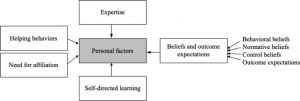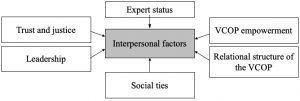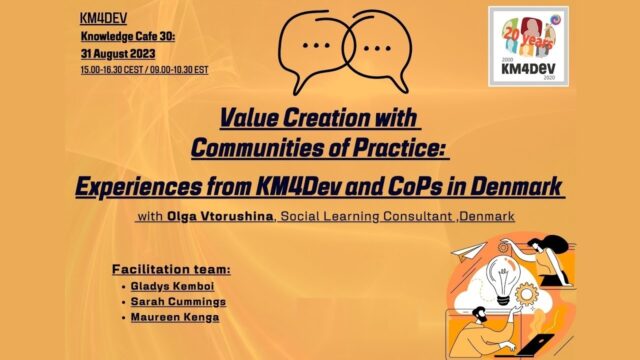
Key factors in knowledge sharing behaviour in virtual communities of practice
Communities of practice (CoPs) are an important knowledge management (KM) tool. They are a group of people who work together on an ongoing basis to share knowledge and expertise in regard to common issues, topics, or practices.
Some CoPs operate face-to-face, for example within a specific office or geographic location, while others are virtual communities of practice (VCoPs) that often operate across large distances, including internationally, through an online environment. Over the past year, VCoPs have become more common than they were previously, with many CoPs unable to meet face-to-face because of the COVID-19 pandemic.
A recent paper1 reports on a systematic review that has sought to understand the key factors in knowledge sharing behaviour in VCoPs, with this behaviour being a significant influence on the viability and success of VCoPs.
The systematic review was conducted using the PRISMA model2. Inclusion criteria were applied to the results of an initial keyword search of the Web of Science, SCOPUS, and Science Direct databases, resulting in the identification of 42 articles for qualitative synthesis.
From the synthesis, the typology of factors associated with knowledge sharing behaviour in VCoPs shown in Figure 1 was identified. Each category of the typology is summarised in Figures 2 to 5 and the following sections.

Personal factors

- Helping behaviours are directed at other VCoP members (altruism) or target the community (pro-community behaviours).
- Need for affiliation is the desire for social contact with other members and membership in the VCoP, and is especially relevant in informal communities.
- Expertise has more influence on participation when it is understood as the quality of the interventions and not simply as permanence in the community.
- Self-directed learning involves autonomy, individual motivation, and member empowerment, which are key factors in promoting participation in VCoPs.
- Beliefs are subjective probabilities that have a decisive influence on the intention and subsequent performance of a behaviour.
- Behavioral beliefs are materialised in aspects such as the improvement of professional competence and daily work efficiency; the establishment of reciprocal relationships; the effort expectancy; the impact on personal image and reputation; the anticipation of recognition, rewards, and incentives; the anticipation of reciprocity; and the quality of the information shared in the community.
- Normative beliefs are associated with social influence, where the probability of sharing knowledge increases if an individual believes that this behaviour is approved by his/her social group of reference or if he/she believes that this reference group would also perform this behaviour.
- Control beliefs refers to the personal or contextual factors that inhibit or facilitate knowledge sharing behaviour. The perception of self-efficacy that an individual has in regard to their knowledge has a significant effect on their intention to continue sharing knowledge in the community, and includes the perception of the capacity to manage both personal constraints and external constraints.
- Outcome expectations refers to the intention to continue sharing knowledge in VCoPs depending on whether the members fulfill their expectations associated with reciprocity, their capacity to help others, the practical usefulness of the knowledge, and the quality of the information shared.
Interpersonal factors

- Trust in a VCoP can be established at different levels: member-member, member-manager, member-institution, or member-channel used for the knowledge exchange. The perception of the competence, integrity, and benevolence of other participants is essential in member-member trust and has decisive influence on the intention of sharing knowledge.
- Justice has been identified as a precursor of trust. On the one hand, trust in members depends on reciprocity (distributive justice) and on the quality of relationships (interpersonal justice), and acts as an antecedent of altruistic behaviour. On the other hand, trust in managers is based on the justice of the policies and procedures of the community (procedural justice) and on promptly informing the members of the procedures of the group (informational justice).
- Leadership highlights the role of the facilitator to promote the commitment of the participants, ensure the standards of the community are upheld, and promote participation.
- Social ties among participants facilitate the awareness that the community exists and are therefore decisive for shaping the perception of the community. The strength of the relationships among the participants is at the same time an antecedent and an outcome of their participation.
- Expert status stands in contrast to expert knowledge. Expert knowledge is a personal characteristic, whereas expert status is awarded by the community as acknowledgment of the contribution of members. Participation plays a prominent role in the acquisition of expert status.
- VCoP empowerment is the collective belief of the members about their capacity to generate value in their organisation, and is a precursor of the online collaboration and performance of the group.
- Relational structure of the VCoP considers its connectivity (network structure) and interactivity (evolution of interactions over time), and the existence a diverse community. Communities with centralized leadership grow faster, because centrality indicates the presence of experts which emphasises the importance of their role as leaders in the growth of the community. However, emerging communities reveal a structure of decentralised communication without groups that monopolise the conversation. With regard to interactivity, on the one hand, participants value the rotational nature of the leadership, which stimulates the incorporation of new active members and knowledge sharing, and, on the other hand, a high rate of past activity, reinforcing the visibility of the community. Diverse inclusive participation may contribute to the diversity of the information sources involved in the VCoP, and the diversity of the community should be controlled to prevent members from feeling saturated.
Contextual factors

- Community (as context) refers to the closeness of the connection between the domain of knowledge of the community and the daily work, which is a key factor that motivates participation and the success of the VCoP.
- Parent organisation culture is one the most important facilitators of participation in VCoPs, with the values and cultural norms of the parent organisation guiding the decisions of VCoP members to share their knowledge. Examples of a supportive parent organisation culture include one that makes time available for community knowledge sharing, such as through assigning part of the workday to VCoP participation; where the organisation’s leaders set an example and provide a supportive environment; and where technical infrastructure is made available. On the other hand, mistrust can be generated and participation inhibited if an organisational culture creates a lack of confidentiality and privacy, or when negative consequences are expected for revealing personal opinions.
- Cultural context is arousing growing interest, and refers to the influence of the national culture and, where appropriate, transnational culture in participation in VCoPs. For example, for VCoPs in China, Chinese cultural values – such as seeking to benefit the collective interest and common goals, concern for others, and the importance of self-reflection – can promote collaborative learning and encourage collective reflection. At the same time, other aspects of Chinese culture – such as modesty in expression and the fear of losing face – should be considered to facilitate effective communication and the willingness to share knowledge. In regard to transnational culture, there will be perceived differences in knowledge credibility based on the differences in the avoidance of uncertainty among the different cultural groups. For example, members of cultures with high avoidance of uncertainty have difficulties granting credibility to knowledge that is shared in the community if it does not come from recognized authorities.
Technological factors

- Individual factors refers to technology-use anxiety, technology-related expertise, and technology-use intention.
- Technical factors refers to the quality of the technology system and its usability and user orientation.
- Environmental factors refers to technical support, which includes the availability of support tools and the quality of the service of the support staff.
Header image source: Alexandra Koch on Pixabay, Public Domain.
References:
- Roberto, H. S., Mónica, G. O., & Bartolomé, R. A. (2021). Key factors in Knowledge Sharing Behavior in Virtual Communities of Practice: A Systematic Review. Education in the Knowledge Society (EKS), 22, e22715. ↩
- Moher, D., Liberati, A., Tetzlaff, J., & Altman, D. G. (2009). Preferred reporting items for systematic reviews and meta-analyses: The PRISMA statement. PLoS Medicine, 6(7), e1000097. ↩
Also published on Medium.






